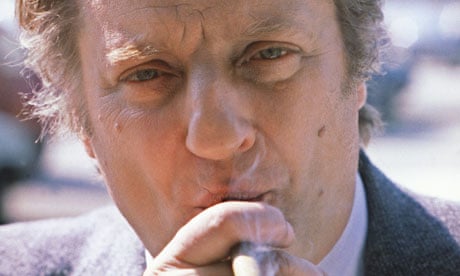Georges Simenon described his creation Jules Maigret, the gruff, pipe-smoking, Parisian police inspector, thus: "His build was plebeian. He was enormous and bony. Hard muscles stood out beneath his jacket… Above all, he had his very own way of planting himself in a spot… He was a solid block and everything had to break against it." Simenon could have been describing the French actor Bruno Crémer, who has died of cancer aged 80. Crémer, who played Maigret on French television in 54 episodes over 14 years (from 1991 to 2005), had hard acts to follow in Pierre Renoir, Jean Gabin and Jean Richard in France, but the role fitted him as perfectly as the hat and heavy overcoat he wore most of the time.
Maigret was the hero of 75 novels, 28 short stories, many films and endless TV series in numerous languages, including Japanese. In the two British series, despite the sterling efforts of Rupert Davis and Michael Gambon, there was an inevitable ersatz Frenchiness, whereas Crémer was the genuine article. When he sat drinking his beer and eating the plat du jour at the corner bistro, one could almost smell and taste the atmosphere. More than most Maigrets, although world-weary and impatient with fools, genuine pain at the human condition could be seen behind Crémer's penetrating grey eyes. As Le Monde put it: "Crémer had the massive allure of an oak, and the fragility of a reed."
Like Simenon, Crémer's parents were Belgian – his father a businessman, his mother a musician – but Crémer was born in a suburb of Paris, and chose French nationality when he reached 18. The youngest of three children, he felt neglected by his family. "I started to act at a very early age, pretending to be angry or sad, creating mini-dramas to gain sympathy," he wrote in his memoir Un Certain Jeune Homme (A Certain Young Man, 2000).
The book tells of his decision to become an actor at 12, his drama studies at the Paris Conservatoire, where among his fellow students were Annie Girardot, Jean-Paul Belmondo and Jean Rochefort, and of the number of good roles in the theatre that followed, such as Saint Just in Jean Anouilh's Poor Bitos (1956). The memoir ends with his first real triumph, two days after his 30th birthday, when he played Thomas Becket in the world premiere of Anouilh's Becket, at the Théâtre Montparnasse on 8 October 1959, a role written with Crémer in mind. Feeling that he could not top that, Crémer left the theatre for film and television work, and rarely returned to the stage. With his large bulk, prominent chin and eagle-like profile, Crémer was bound to be cast as soldiers, gangsters and policemen.
An early, powerful screen role was as the second world war veteran Sergeant Willsdorf leading an inexperienced French platoon in Indochina in 1954 in Pierre Schoendoerffer's The 317th Platoon (1965), arguably the best film on that colonial conflict. Schoendoerffer cast Crémer again as a soldier, albeit a disillusioned one, in Objective 500 Million (1966). In the same year, Crémer played Colonel Henri Rol-Tanguy, one of the leaders of the communist resistance in Paris during the second world war in René Clément's all-star Is Paris Burning?
Similarly, Crémer was the leader of a group of underground resistants trying to rescue a comrade from the Nazis in Costa-Gavras's Shock Troops (1967). But Crémer was rescued from typecasting by Luchino Visconti, who gave him the role of the dogmatic prison priest in The Stranger (1967), based on the Albert Camus novel, with Marcello Mastroianni as the murderer Meursault.
Crémer was back in the military in a few commercial movies until, for Costa-Gavras again, he was a journalist on the communist daily L'Humanité, condemned to death by a Vichy tribunal in Special Section (1975). Unfortunately, Crémer's first venture into Hollywood movies was in William Friedkin's pointless remake of Henri-Georges Clouzot's high-octane thriller The Wages of Fear, retitled Sorcerer (1977). His only other English-language film was Money (1991).
In 1981, on stage in Paris, Crémer played a homosexual in a Nazi concentration camp in Martin Sherman's Bent. In an interview at the time, Crémer declared: "The reason I'm acting in this play is to make known to the public something that has remained hidden, like a stain. To a certain extent, the persecution of homosexuals continues."
Crémer's most recent appearance in a film released in the UK was in François Ozon's Under the Sand (2000), in which he played Charlotte Rampling's husband, who she refuses to believe is dead. But, in France, Crémer will always be identified with Maigret, through whom he was able to express so much of his own reticent and contemplative personality.
He is survived by his second wife, Chantal, whom he married in 1984, their two daughters, and a son by his first marriage.
